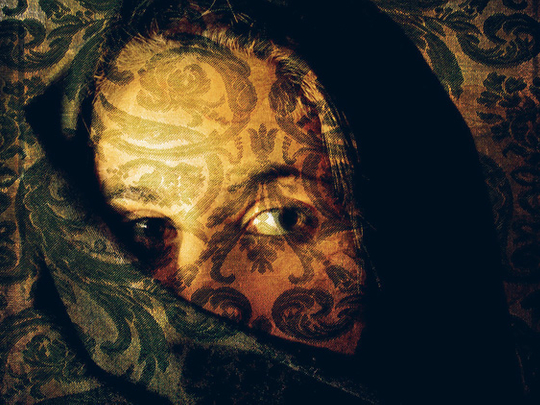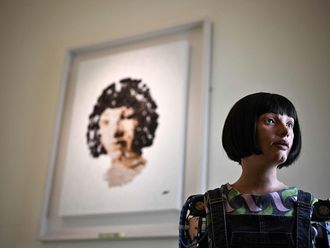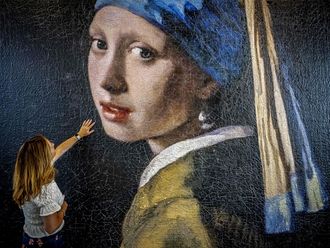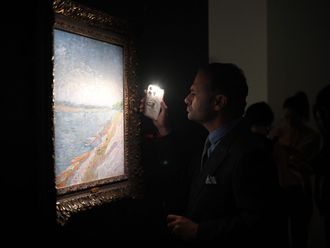
Marwa Adel's photographs speak about the struggles she has faced in life. They express her desire to break free from the shackles imposed on women by society and to be the person she is rather than what society forces her to be. Adel's work is deeply personal but every woman is sure to connect with her story.
The Egyptian artist has a masters degree in advertising and is a lecturer at the Faculty of Applied Arts at Helwan University, Cairo. Since the beginning of her career, Adel has defied traditional norms by using pictures of the human body in her work.
She has also won many awards for her bold and powerful artworks. In her latest series, titled Memory, the artist has once again used photographs of herself and her friends to depict memories of her personal journey — from an early marriage, motherhood and dealing with a bad relationship to her courageous fight to change her life and express her individuality.
"Our body is the container of our soul. It holds the memories that shape our thoughts, our feelings and our dreams, which are reflected through our body language and expressions. But there are so many restrictions surrounding the human body in Middle Eastern societies, especially for women. Our culture makes us fear our body, which is like fearing ourselves. The layers of clothing we are covered in represent the feelings and aspirations that we are forced to hide.
"Every woman is different, because her memories and the feelings linked to them are unique, but we are all expected to conform to a stereotype based on the demands of others. Through these pictures I want to talk about the interaction between the body and the memories and the dreams they hold. I want to express the feelings of women all over the world, about the things they cannot do, the dreams they cannot fulfil and the freedom they long for. And I want to tell women that even though we cover our bodies, we must not cover our minds," Adel says.
Her artworks combine carefully posed photographs of models with metaphorical pictures of fragile leaves, flowers and thorns and objects such as her wedding ring and the wedding card that hold bitter-sweet memories.
To these she adds pieces of her calligraphic paintings with words describing her feelings, and digital textures and light effects to create powerful and eloquent images. Her sepia-toned pictures depict memories that are painful and those that give her the strength to fight on.
In some of the images, the women hide themselves and their feelings under their clothes. In others, they shed not only their inhibitions but also the fears and struggles in their lives and the oppression and restrictions forced on them in the name of tradition, culture or religion.
Every piece conveys strong emotions and every pose, word and nuance is filled with meaning. For instance, a triptych titled Beside You featuring the artist in her wedding dress expresses how stifled a woman feels in marriage.
"My wedding ring and the veil covering me depict how difficult this relationship is in my country. A woman must always keep quiet and do what her husband wants. She has to be a good woman in the eyes of the man, not in her own eyes. And that is the root of the conflict in this relationship," Adel says.
Another poignant piece titled Harmony focuses on the sadness in the eyes of a woman who is just waiting — waiting for things to happen to her, powerless to change her life or her destiny.
Her anger towards society and men is expressed in an image of a man, whose face is hidden and turned away from the woman in the picture. "This man is trying to pretend he is powerful but cannot face the woman because it is fake power. His power only comes from the weakness of women — because we accept to be silent," she says.
But in another work, where a man is likened to dead, dry leaves, she accepts that men are also victims because society forces them to play a role and not show weakness.
Several other pieces depict her suffering and struggle. But subsequent pieces in the series show her resolve and strength in overcoming her problems and achieving her dreams.
In a triptych titled Dream, she depicts the different stages of her life. In the first piece, the artist, covered with clothes, watches the birds soar in the sky and dreams of being free. In the next piece, the birds encourage her to fly with them and she uncovers her face and tries to move forward. In the third piece, the birds and Adel become almost one. "I found strength and learnt to change the bad things in my life to good and use the clothes covering me as wings to fly," she says.
The series ends on a positive note with a piece titled Hope, which depicts a young boy. "I believe there is hope in the next generation. It was the women's mistake to treat their sons as kings and now it is up to them to reshape the mindset of our boys and change society," Adel says.
Jyoti Kalsi is a UAE-based art enthusiast.
Memory will run at Art Sawa until December 18.












